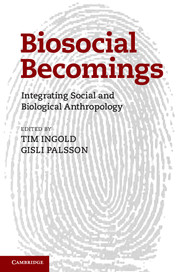Book contents
- Frontmatter
- Contents
- Preface
- 1 Prospect
- 2 Ensembles of biosocial relations
- 3 Blurring the biological and social in human becomings
- 4 Life-in-the-making: epigenesis, biocultural environments and human becomings
- 5 Thalassaemic lives as stories of becoming: mediated biologies and genetic (un)certainties
- 6 Shedding our selves: perspectivism, the bounded subject and the nature–culture divide
- 7 Reflections on a collective brain at work: one week in the working life of an NGO team in urban Morocco
- 8 The habits of water: marginality and the sacralization of non-humans in North-Eastern Ghana
- 9 ‘Bringing wood to life’: lines, flows and materials in a Swazi sawmill
- 10 Humanity and life as the perpetual maintenance of specific efforts: a reappraisal of animism
- 11 Ravelling/unravelling: being-in-the-world and falling-out-of-the-world
- 12 Retrospect
- References
- Notes on the contributors
- Index
1 - Prospect
Published online by Cambridge University Press: 05 June 2014
- Frontmatter
- Contents
- Preface
- 1 Prospect
- 2 Ensembles of biosocial relations
- 3 Blurring the biological and social in human becomings
- 4 Life-in-the-making: epigenesis, biocultural environments and human becomings
- 5 Thalassaemic lives as stories of becoming: mediated biologies and genetic (un)certainties
- 6 Shedding our selves: perspectivism, the bounded subject and the nature–culture divide
- 7 Reflections on a collective brain at work: one week in the working life of an NGO team in urban Morocco
- 8 The habits of water: marginality and the sacralization of non-humans in North-Eastern Ghana
- 9 ‘Bringing wood to life’: lines, flows and materials in a Swazi sawmill
- 10 Humanity and life as the perpetual maintenance of specific efforts: a reappraisal of animism
- 11 Ravelling/unravelling: being-in-the-world and falling-out-of-the-world
- 12 Retrospect
- References
- Notes on the contributors
- Index
Summary
Death of a paradigm
Neo-Darwinism is dead. The paradigm that has long dictated the terms of accommodation between the sciences of life, mind, society and culture has been brought down by the weight of its own internal contradictions, by the manifest circularity of its explanations, and by the steadfast refusal of human and other organisms to conform to the straitjacket that its architects had created for them. This is not to deny that it continues to enjoy massive public, political and financial support. Its leading protagonists are among the biggest ‘names’ in science. In a market-driven environment, they have become celebrities and their doctrines have become brands. They have run a propaganda machine that has been adroit in playing to popular stereotypes and ruthless in the suppression of dissenting voices, variously dismissed as ill-informed, politically motivated or temperamentally hostile to science. Some adherents of the neo-Darwinian creed have feigned puzzlement as to why so many scholars in the social sciences and the humanities refuse to sign up to it. This has been attributed, variously, to disciplinary myopia, sheer prejudice, or the allure of such fads and fashions as post-modernism, relativism and social constructionism (Perry and Mace 2010). The one possibility that adherents cannot countenance, however, is that their critics – many of whom are more widely read in the histories and philosophies of science and society than they are, and have thought long and hard about the conditions and possibilities of knowing and being in the one world we all inhabit – might have good reasons to find the paradigm wanting. To admit as much would, after all, be to question the very foundations of their own belief. Rather than seeking to counter the critical arguments that have been levelled against it, their strategy throughout has been to question the intelligence, competence and integrity of those who articulate them. This strategy marks the paradigm out as a form not of science but of fundamentalism.
- Type
- Chapter
- Information
- Biosocial BecomingsIntegrating Social and Biological Anthropology, pp. 1 - 21Publisher: Cambridge University PressPrint publication year: 2013
- 66
- Cited by



